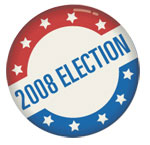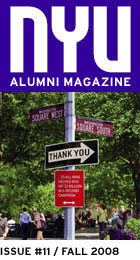new politics
Race–ing for Office
Are we closer to judging a candidate by the content of his, or her, character?
by Courtney E. Martin / GAL ’04
As a campaign aide in the tense 1998 Oklahoma gubernatorial race, Charlton McIlwain attended a rotary event to represent his candidate, former state legislator Laura Boyd. When Boyd’s opposition, incumbent governor Frank Keating, arrived, he took one long look at McIlwain, the only minority in the place, and asked: “Are you serving dinner?”Only a decade later, the race for the White House has rewritten many of the old rules (and behaviors) of politics, notes McIlwain, now an assistant professor in the Steinhardt School of Culture, Education, and Human Development who studies racial appeals in political communication. He sees several likely reasons for the shift, but none more prominent than Barack Obama’s ability to break the mold of how a black candidate communicates with the general populace, especially America’s young adults.
According to PBS’s NewsHour With Jim Lehrer, more than 5.7 million eople under the age of 30 voted in the primaries and caucuses—a 109 percent increase from the 2004 primaries. Many of those votes were cast for Obama, who, McIlwain says, managed to make race both an issue and a nonissue at once. “[His] campaign balances on the message that, on the one hand, he is not defined by his race, nor does he plan to make race–based policy decisions,” McIlwain says. “But on the other hand, he is authentically black and doesn’t mind if you want to vote for him because of it.”
Of course it wasn’t just the Illinois senator’s deft campaign skills that helped shatter the glass ceiling of American politics. He had help from George W. Bush’s administration, which, with an unpopular war, a crippled economy, and unprecedented gas prices, suffers from some of the lowest approval ratings in history. In fact, McIlwain believes that a perfect storm of “corruption, violence, and cynicism across the political spectrum” made conditions ripe for Obama’s battle cry for change, which consistently emphasizes improvements for all. McIlwain says: “When asked if his approach would be based on racial realities to a debacle like [Hurricane] Katrina, Obama skillfully redirects—admitting that, yes, the majority of those who were affected were poor and black, but that fixing our emergency response system will be good for everyone.”
Beyond the anxious political climate, a recent study appears to confirm Americans’ increasing and earnest support for those deemed nontraditional candidates. Brian McCabe and Jennifer Heerwig (GAL ’05), doctoral candidates at the Graduate School of Arts and Science, found that, contrary to previous thinking, people with college degrees are less likely to give a “right” answer that misrepresents their real action (e.g., whites may say they are comfortable voting for a black president when, in fact, they aren’t). At the same time, voters today are more diverse and more educated than ever before, signaling a potential change in the perception of just who qualifies as “electable.” “Obama’s being black personifies the far reaches of change that Americans are so hungry for,” McIlwain explains. “He was attuned to the public mood and knew it was the time [to run].”
Regardless of the outcome in November, Obama, Sarah Palin, Hillary Clinton, and John McCain, have forever changed the nature of political communication. After 43 presidents, pundits can no longer claim that America would not seriously consider a female, a black, or a 70– plus–year–old candidate. This is significant not just for the presidency but for building a federal government that more accurately represents a country in which women make up more than half of the populace and minorities make up a third. McIlwain predicts: “It will be just a little easier for the next female presidential nominee, the next black candidate for Senate, or the next Latino, female congressional hopeful.”








